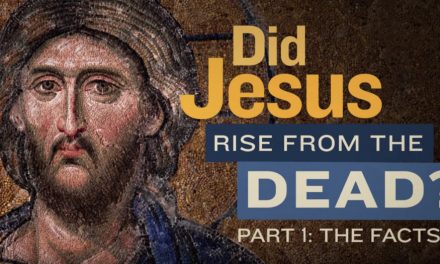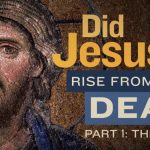An excerpt from Denyse O’Leary’s comprehensive book on the theories surrounding the origin of life.
Before the 18th century, most people believed that the universe and time began when God created it. But from the 18th century until the mid-20th century, many scientists doubted that the universe even had a beginning. The idea of a beginning to the universe was considered a religious belief. Typically, scientists accepted an eternal universe, of never-ending binding and unbinding atoms over an infinity of space and time. Listen carefully to the scripts of some old science fiction movies, and you will still hear the echoes from the eternal void.
Then, in 1927, an obscure Belgian priest and cosmologist, Georges Lema”tre (1894-1966), an early follower of Einstein, proposed that the universe popped into existence between 10 and 20 billion years ago, beginning with a single point.
Lema”tre’s theory was revolutionary. It overturned a century and a half of science. Initially, many scientists did not like the theory much, and some, like Arthur Eddington (1882-1944), said so. His comment was: “Philosophically, the notion of a beginning to the present order is repugnant to me. I should like to find a genuine loophole.” To most scientists of the day, it sounded too much like religion. Thus, Lema”tre, a priest, was in the unusual position of trying to focus attention on the science that supported his idea, while many atheists were more concerned with the religious implications. This odd turnabout continues to the present day, as we will see.
The Difference a Beginning Makes
If the universe has existed forever—or waxes and wanes in cycles—absolutely anything can happen, given the infinite amount of time available.
Now, just for a moment, let’s picture the universe as a Universal Lottery. Perhaps neither you nor I are in the habit of buying lottery tickets, but for our illustration we must use the assumptions of scientists who view the universe that way. Well then, suppose we have pooled our money and bought a book of 10 consecutive lottery tickets.
There is nothing unusual about our winning a lottery in which we have bought tickets. Indeed, suppose the universe is eternal. Over time, if tickets continue to be drawn indefinitely, our numbers will eventually come up. In fact, they will come up an infinite number of times, long after we are no longer around to claim our reward.
An eternal universe would work that way. All physically possible events would happen at some point. Its Universal Lottery is not guided by anyone because no guidance is needed. It just goes on drawing tickets forever. So the universe goes on and on, eternally evolving new and surprising situations—eventually it evolves into the very situation we are now experiencing.
However . . . if the universe has a beginning—even if that beginning was a very long time ago—what happens to our Universal Lottery? Think about it. Here are some ways in which the Universal Lottery must change:
The number of tickets that can win shrinks dramatically. That is because only a certain number of draws can be made in the allowable time. Perhaps none of our tickets will be drawn.
Lots of unlikely things can still happen. For example, one of our tickets might win the lottery anyway.
However, every unlikely thing cannot happen because there is not enough time.
Suppose that in our Universal Lottery, there are 50 billion tickets. The odds that a ticket in our book will be a winner are very small but possible. Yet, what if, suddenly, every one of our 10 tickets is called in perfect order, in a row, as a prizewinner. We know that is highly unlikely, even impossible. The lottery, which is now time limited, could not possibly randomly draw every ticket in our book, and no others, in the exact order in which the tickets are numbered. The lottery must have been “fixed”—designed so that we would win. That is indeed the universe we are living in. It appears fixed so that we would win.
Now, science is turning away from the concept of an eternal universe. The universe is thought by most cosmologists to have begun no more than 14 billion years ago. Its future life is estimated at about 100 trillion years. That sounds like a lot of time, and it is. The important thing to see, however, is that any finite amount of time, even if it is very large, enables us to calculate the odds of a given event.
As we will see, from the science evidence available today, our tickets have come up an amazing number of times. The coincidences that enable us humans to exist—which is what the Universal Lottery represents—now seem statistically impossible. Unless, that is, there is some sort of design at work.
The next question is: Does this mean that there would be an impact on “modern” culture? The answer is yes. Let’s look at the ways.
Why “Modern” Culture Is On the Way Out
It may not be apparent at first glance, but the concept of the universe as an endless lottery of meaningless events actually shaped the “modern” culture of our society, from about the 1850s on. Modern culture, better known as “modernism,” was the culture created by the theories of Darwin, Marx, and Freud. We humans were believed to be just an accident, living on a mediocre planet, circling a suburban star, in an irrelevantly repetitious universe. For culture, that means, among other things, “no God,” “no meaning,” “no purpose,” and “no rules!” Not surprisingly, we have all heard these themes sounded every day from every source. They have driven the key questions that dominate modern society, such as:
“Can we find meaning in a world without God?” (God’s absence is taken for granted because there is no need for a creator in an eternal universe.)
“How can a human life be important?” (If we just happen to exist, then we aren’t important.)
“What kind of morality should we have, if any, if God does not exist?” (A random universe can offer no moral guidance, and it is presumptuous to assume that we can really decide between right and wrong, or determine truth.)
Henri Frederic Amiel expressed this modern view clearly when he wrote, in 1868:
The universe is but a kaleidoscope which turns within the mind of the so-called thinking being, who is himself a curiosity without a cause, an accident conscious of the great accident around him, and who amuses himself with it so long as the phenomenon of his vision lasts.
And, continuing the theme well over a century later, in 1986, zoologist Richard Dawkins wrote:
Natural selection, the blind, unconscious, automatic process which Darwin discovered, and which we now know is the explanation for the existence and apparently purposeful form of all life, has no purpose in mind. It has no mind and no mind’s eye. It does not plan for the future. It has no vision, no foresight, no sight at all. If it can be said to play the role of the watchmaker in nature, it is the blind watchmaker.
Yet, even as art, literature, and science were churning out endless riffs based on these propositions, a critical change was taking hold in science. A key moment was Lema”tre’s idea. Once science accepted the idea that the universe might have a beginning—and perhaps an end—it confronted a radically different picture of the universe from the “meaningless universe” of modernism. In some ways, it is a scarier one. But because it comes from the findings of contemporary science, it will have as much of an impact on our culture as the meaningless universe of modernism did. Key new findings in science usually do change culture and society.
What Does This Mean for Religion?
Many people, sensing a change in the wind, assume that the basic assumptions of modernism are false. Increasing numbers are looking elsewhere for answers. Ironically, one outcome is a  worldwide resurgence of traditional religion. In North America, for example, liberal religious denominations that have aligned themselves with modernist philosophy are stagnant and graying, while non-modernist ones are growing rapidly.
worldwide resurgence of traditional religion. In North America, for example, liberal religious denominations that have aligned themselves with modernist philosophy are stagnant and graying, while non-modernist ones are growing rapidly.
Some commentators argue that this situation simply reflects the “political muscle” of orthodox religious believers. In other words, it is merely a political event. They are mistaken. The change is a
fundamental shift in how people look at questions about God, life, and the universe. It is a result of a change in the picture of the universe provided by science.
Shortly before he died, in 1966, Lema”tre, who in his life had never sought or received much publicity, learned a critical piece of news. Two American physicists had discovered what is called the “signature” of the Big Bang: the microwaves that have been spreading throughout the universe ever since it took place.
The idea that the universe has a beginning is now overwhelmingly accepted by cosmologists. But that did not happen without conflict. And what is even more interesting, the conflict had far more to do with defending the modernist religion of a meaningless, God-free universe than with science evidence.
So Evolution Means What?
Evolution is the theory that all life forms are descended from one or several common ancestors that were present on the early earth, three to four billion years ago. It includes the process by which one species is transformed into another, for example a dinosaur species into a bird species. There have been a number of models of how evolution works, including models that assume divine guidance or perhaps divine intervention at various points along the way.
So Darwinism Means Exactly What?
The fundamental principle of Darwinian evolution is common descent by fully naturalistic means. Common descent is the belief that all life forms, including ourselves, are descendants of a common ancestor (or possibly several common ancestors) billions of years ago. Scientists differ, often sharply, about the details. “Naturalistic means” is a way of saying that natural law acting on chance events explains everything that happens. Life came into existence by chance and developed by chance, without design, guidance, or intervention by God or an intelligent designer. Or, if there were any divine design, guidance, or intervention, it could never be scientifically detectable.
In his epoch-making On the Origins of the Species, published in 1859, Englishman Charles Darwin argued that there was no actual design to nature; the laws of nature acted by chance and created all the life forms that we see from a common ancestor. The fittest ones survived by developing endless adaptations (changes). In other words, Darwin provided a theory for how life forms develop from a common ancestor without design or outside intelligent influence.
He called the process natural selection. Scientists liked Darwin’s simplification. It especially suited the materialistic world of 19th-century England. It provided a powerful support for a belief that was already rapidly growing among intellectuals that the universe was Godless and meaningless, and that human beings were a random outcome of its processes. Thus, Darwin became the popular central figure in biology in the same way that Freud had in psychology, and Marx in politics. The fact that these men were elevated as dominant figures did not, of course, mean that everyone agreed with them. It did mean that everyone had to take their claims seriously, and if they disagreed, they had to construct a viable alternative view.
From the beginning, scientists identified problems with Darwin’s assumptions. These problems did not attract much attention, because scientists assumed that they would just be sorted out one day. For example, Darwin thought that the world under the microscope consisted of simple jellies and crystals that could easily form randomly. He could not have been more wrong. It was only with the dawn of biochemistry in the 1950s—when scientists were able to look into cells deeply and in detail—that they realized how wrong he was. The world at a microscopic level is almost as complex as the world above it.
It was difficult to understand how complex cells can be created simply by law acting on chance. We do not know of an “early, simple version” of cells or organs. Even the “simple” version had to be complex in order to exist. Respected scientists, such as Fred Hoyle, checked out of believing in a simple Darwinist explanation for the origin of life in the early 1970s, for precisely this reason. So why is Darwinism still entrenched?
Darwinism continues partly because it is the historical model of biology and partly because it underwrites the modernist religion. But more and more of the evidence supporting Darwinism just does not withstand close scrutiny.

The growing political uproar around the teaching of evolution is fuelled by the fact that Darwinism is the only model of evolution that is permitted in most school systems. Indeed, some teachers have been forbidden even to bring up known problems with the theory. This is because modernism is the unacknowledged religion of tax-supported public school systems, and Darwinism is one of modernism’s most important teachings. Just as you would not be permitted to argue against Christianity in the pulpit of a traditional church, so teachers are not permitted to argue against Darwinism in the lectern of a modernist school or university.
What’s Intelligent Design (ID) Theory?
ID theory started to take shape in the late 1970s, as an outcome of information theory. Faced with the enormous complexity of living things—for example, the fact that complete instructions for creating DNA would be as long as the DNA code itself—ID theorists argue that it makes more sense to assume that the information is a language. In other words, it is a product of design. This is the complete opposite of Darwinism.
Reintroducing design would, of course, change the way many problems in science are perceived. The ID scientist does not try to figure out how things happened by chance, but rather looks for intentional patterns that suggest general laws of development. The laws that prevail in one situation may shed light on another.
Darwinists view ID as heresy because they are committed to a “no-design model” and would prefer to continue looking for solutions to the mystery of life via law and chance.
Isn’t This Just ‘Religion’ Versus ‘No Religion’ All Over Again?
No. All parties to the debates have a religious stance of some type. Many atheists who are Darwinists actively promote a “no-God religion,” which they think is better suited to the times we live in than traditional religions. Many other Darwinists are religious people, sometimes devout Christians. One example is the American biochemist Ken Miller, a practicing Roman Catholic who is the author of Finding Darwin’s God. During my research, I also ran across a number of atheists or agnostics who are non-Darwinists or post-Darwinists.
In the end, the conflict is between those who think that Darwinism can survive the collapse of modernism—a collapse that has already taken out Marx and Freud—and those who think that, on the contrary, design belongs as much in biology as in cosmology.
The Best Arguments For Design
Design advocates point to the sheer complexity of life forms as their strongest argument. Within the 14 billion or so years that are the age of the present universe, does either chance or necessity produce the complex molecular machines that form cells, the building blocks of animals and plants? Or is there an element of design?
Fred Hoyle was one scientist who was aware of the problems that the origin of life presented to scientists’ materialist worldview. He had to admit, against his preferences, that life forms look as though they are designed. He compared Darwin’s belief that life just happened somehow to the hope that a tornado in a junkyard would somehow manufacture for us a Boeing 747.
Hoyle did not like design, and he continued to propose alternatives to the end of his life, as he did with the Big Bang. But he never found one that really worked.
Some scientists, especially biochemist Michael Behe of Pennsylvania’s Lehigh University, author of the controversial Darwin’s Black Box (1996), have begun to argue that Darwinism—which explains everything in terms of law and chance—does not account for either the existence or the evolution of the complex machinery of cells. And we cannot talk about life without talking about cells. Every life form is either a cell or a highly organized, interconnected, indivisible nation of cells. Or, as Davies puts it: “Even a simple bacterium is a vast assemblage of intricately crafted molecules, many of them elaborately customized.”
Behe calls some of the machinery in cells “irreducibly complex.” He means that there are no “simple” cell systems that could just arise by chance from the six organic elements (calcium, carbon, hydrogen, nitrogen, oxygen, and phosphorous) and then evolve into complex cell systems. That is because there is no simple way of doing the jobs that these systems do. A creature with a simpler arrangement could not live at all. A little malfunction here or there, and the cell does not evolve to a higher form of life; it dies. One reason that cells are complex is that they must use molecular machinery to force elements and chemicals to do things that they do not normally do.
Behe is a key proponent of intelligent design theory. According to him, the cell works the way it does because at least some of its complex machinery was intelligently designed. Science cannot understand life as long as it excludes design.
Needless to say, Behe was soon roundly denounced by the Darwinist establishment. As Thomas Woodward puts it in Doubts About Darwin: A History of Intelligent Design, Behe’s dissent was “the first time sophisticated skepticism of naturalistic evolution was brought to center stage in American society.” The reaction was predictable. One of the world’s foremost philosophers of evolution, Michael Ruse, has said of Behe, “I think he is wrong, wrong, wrong . . . ” Ruse directs his readers to Darwinist author Ken Miller to be rightly instructed.
To understand Ruse’s and other Darwinists’ responses, we need to keep in mind that Darwinian evolution is not just a theory. Darwinism eliminates design, and to the Darwinist, eliminating design is science. The fact that Behe is not a creationist and accepts a role for evolution does nothing to turn aside shock and anger at his views











